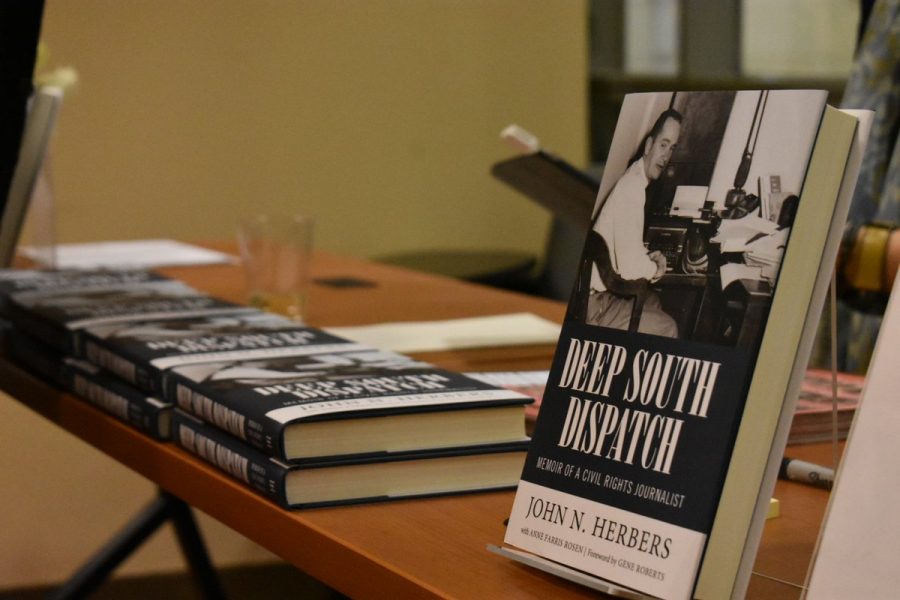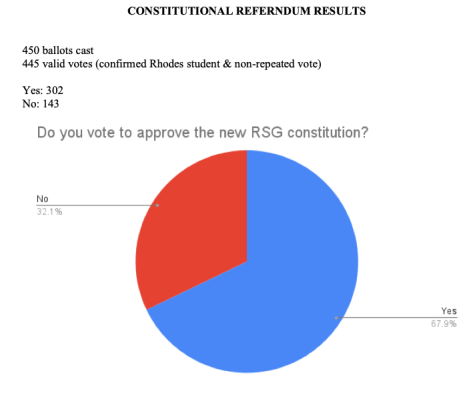Rhodes alumna celebrates father’s life in ‘Deep South Dispatch’
October 5, 2018
“Deep South Dispatch, Memoir of a Civil Rights Journalist,” tells the tale of the early life of John N. Herbers. Herbers wrote the book with the help of his daughter, Anne Farris Rosen. Rosen is a renowned journalist who is currently teaching at the University of Maryland. Rosen is also a Rhodes alumna from the class of 1978 and is a former writer for The Sou’wester. The event included questions on the part of of Lynne and Henry Turley Memphis Center Director Charles Hughes who asked Rosen about the experience writing the book, her personal journalism experience, and her father, who passed a year before this book’s 2018 publication date.
“When I called him to tell him I wanted to be a journalist, he said, ‘Oh no,’” Rosen said.
At first Rosen resisted a career in journalism because of her father’s fame. However, later in her career at Rhodes, she decided it was what she wanted to do. Upon graduating she began to work for Memphis’s Community Development Center. There, seeing journalists rush to the scene of a story—specifically Elvis’s death—cemented her desire to become one of them.
“I think journalists work a lot harder than people think they do to get things right and get the story,” Rosen said.
In a time when trust in journalists is low and the profession itself is in flux, Rosen explained many journalists are still dedicated to the truth. Additionally, the journalism program she has taught in has seen a recent enrollment increase of 50 percent, which they believe might be due to Trump’s election and people’s corresponding desire to uncover the truth.
The book itself focuses on the early life and career of Herbers. Beginning with a family background and his childhood and cataloguing his career and growth into his old age. The first part of the book, through the section on Emmett Till, was written by Herbers roughly twenty years ago—it wasn’t until Rosen pressed him ten years ago that the two began to work “elbow to elbow” as Rosen said, to finish the book. Herbers seemed to be present at every major event. From Speeches to assassinations Herber saw and covered much during his career. This book distills his experiences and works into his life story.
“I called him the Forest Gump of Journalism,” Rosen said about Herbers. “The most difficult part I had was getting him to be more introspective.”
Her father, a reserved man with a career that placed him at the most important events of the 20th century, had very little to say about his opinion on what he had seen. To combat this Rosen would “sit him in front of his typewriter” prompting him to write even a little about how he felt.
“I felt I was primed all my life to write this book,” Rosen said.
During her early life her mother created a home for the family and attempted to shelter Rosen and her siblings from the harsher aspects of Herbers’s work. Still, as Rosen aged, more and more of her father’s work was revealed to her and she often would accompany him. The family was once even driven out of St. Augustine when Herbers was reporting on Martin Luther King Jr.’s involvement in the civil rights movement there.
The book itself combines the memoir format with Herber’s articles creating, partially because Herber was present and wrote on almost every single major event of his career, a historical memoir. Each chapter is a discrete narrative arc, though later chapters do pull from earlier ones as the overall story progresses.














